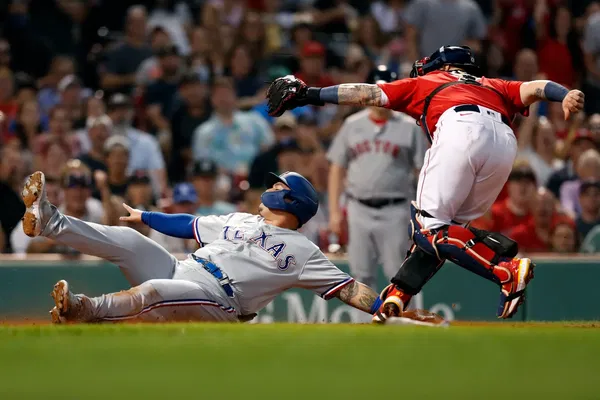

There’s a little extra spark when the Boston Red Sox and Texas Rangers play one another, sometimes leading to arguments with the umpires – remember Texas Manager Bruce Bochy getting tossed for arguable calls just last August? That familiar tension bubbled up dramatically this weekend. It’s a reminder that close calls in tight games often get heavily scrutinized.
And when the fate of a match hangs in the balance, as Saturday night’s did, every decision made behind home plate takes on an outsized significance, sometimes shifting momentum — even the final result.
The March 29 game between the Red Sox and Rangers was a thriller from the very first pitch. Adolis García’s two-run double helped the Rangers take an early lead, but Red Sox rookie Kristian Campbell helped tie the game with his first career homer. García wasn’t done, launching a go-ahead solo home run before Texas tacked on another run. Boston fought back, getting within 4-3 in the eighth, but could not finish the job, leaving 10 runners on base.
ADVERTISEMENT
Article continues below this ad
That one-run margin quickly became a focus of controversy beyond the Red Sox’s offensive woes.
Immediately after the final out, the focus turned toward home plate umpire Adam Hamari. “UmpScorecards” posted an analysis of Hamari’s call. It wasn’t simply a practice report: It offered data that pointed to serious problems throughout the night. That fired up an argument online, as many believed the umpiring could have been a determining factor.
Umpire: Adam Hamari
Final: Red Sox 3, Rangers 4#DirtyWater // #AllForTX#BOSvsTEX // #TEXvsBOSMore stats for this ump 👇https://t.co/BdIy0Ttrwf pic.twitter.com/xbyX5f5dDu
— Umpire Scorecards (@UmpScorecards) March 30, 2025
Digging into Hamari’s report card shows why fans were so upset. His overall accuracy was 93%, whereas the expected percentage is 95. But that’s only half of the story. His performance compared with his peers was -1.8% relative accuracy. His 78% strike calls were the most obvious problem, well below the MLB average of 88%. And that showed inconsistency in his zone, even though he was nearly perfect on ball calls (99%).
But the stat that really sparked outrage was the “Overall Favor,” which came in at a staggering +1.51 runs for the Texas Rangers.
Basically, the review suggested that Hamari’s calls provided Texas with a run-and-a-half lead over the game. A significant edge in a contest decided by a run. The report also singled out significant missed calls early in the game when Boston had runners on, potentially killing key scoring opportunities.
This alleged bias, combined with the direct effect on the score, fumed many fans, with doubts around the game’s legitimacy.
Familiar frustration: Red Sox fans and perceived injustice
The feeling among Red Sox Nation that the umpire had a direct hand in the close loss was instant and deep.
I thought Adam Hamari was brutal yesterday and directly affected the outcome of the game.
— T. C. (@crawfnut) March 30, 2025
Official reports did not individually highlight Hamari for this particular game. But his past includes controversial ejections like White Sox manager Pedro Grifol’s in 2023. This history shows precisely why fans are quick to become frustrated when his calls feel off. Plus, it was just 4-3.
A call strike accuracy of 78% is bad at the MLB level. This cannot continue to be allowed.
— Brandon Smith (@brandonsmith071) March 30, 2025
This frustration was firmly backed by the data from Hamari’s scorecard, particularly his poor performance in managing the strike zone. And indeed, 78% strike accuracy is well below the standard MLB metric (roughly 88%) and is a huge concern. Now, fans are looking at it as systemic unreliability that had an outsized effect on hitters and the game as a whole.
Give me the robot umps!
— Conor Bruen (@BringerOfRain4) March 30, 2025
Naturally, seeing such questionable numbers caused many fans to demand technological solutions. With automated systems achieving incredibly high accuracy (99.9% in Korea) and already fixing many human errors (51%) during MLB trials, fans couldn’t hold back on sharing this sentiment. Probably, they have every right to think that technology is a surefire solution to the frustrating umpire show.
ADVERTISEMENT
Article continues below this ad
Season has officially begun because the Red Sox r getting screwed
— the red sox troll (@degandrew31) March 30, 2025
For some seasoned fans, such perceived injustice was a familiar opening footnote to a long baseball season. This sort of second-guessing often reverberates with the recent history of perseverance the team displayed, how it turned a rough 10-19 start last season into an improbably late rally against the Yankees in July, contributing to the familiar sense of “here we go again.”
ADVERTISEMENT
Article continues below this ad
Such dramatic turnarounds fuel a familiar feeling: Overcoming obstacles, including perceived bad calls, is just part of the Red Sox experience. Don’t they?
ADVERTISEMENT
ADVERTISEMENT
ADVERTISEMENT
ADVERTISEMENT

